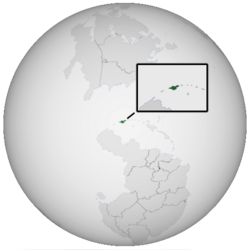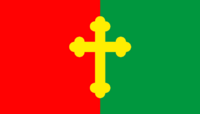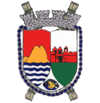Jaragua (Elparia)
Jaraguan Republic Republic Jaraguano | |
|---|---|
| Motto: "Revolution nyah sleep
(Revolution never sleeps)" | |
| Anthem: ¡Onward! | |
 | |
| Capital | Spira |
| Largest | Branton |
| Official languages | Jaraguan |
| Recognised national languages | Arellian |
| Recognised regional languages | Inner Jaraguan |
| Religion |
|
| Demonym(s) | Jaraguan |
| Government | Unitary one-party republic under an autocratic hereditary dictatorship |
• First Director | Justin Mendez |
• Second Director | Edmundo Castillo |
| Legislature | National Directorate |
| Presidium | |
| Chamber of Directors | |
| Independence from Arells (Elparia) | |
• Independence Declared | 29 May 1927 |
• First Republic | 1 March 1947 |
• Military Government | 8 April 1966 |
• Revolutionary Government | 15 January 1970 |
• Second Republic | 31 December 1979 |
| Population | |
• 2023 estimate | 1,720,273 (78th) |
• 2018 census | 1,678,591 |
| GDP (nominal) | 2023 estimate |
• Total | $30 billion (64th) |
• Per capita | $17,712 (36th) |
| Gini (2020) | 39.6 medium |
| HDI (2022) | .808 very high (44th) |
| Currency | Jaraguan Peso ($) (JP) |
| Date format | dd/mm/yy |
| Driving side | right |
| Calling code | +13 |
| Internet TLD | .ja |
Jaragua, officially the Jaraguan Republic, is an island country comprising the island of Jaragua and several small islands and cays off its coast. It is located within the Coltegan Passage in the Tainean.
Jaragua is a totalitarian dictatorship with a comprehensive 'cult of the party' as described by political analysts. Freedom International labeled the country as a 'police state'. Despite this label, the country remains an extremely popular tourist destination and is also known for its booming marijuana industry. Local elections are sometimes held but only at the discretion of the state (usually every 4-5 years). With the most churches per square kilometer, Jaragua is oftentimes considered the most Christian country in Elparia. Laws against sacrilege are strictly enforced. Jaragua is called the "world's smallest cultural power" due to the impact of reggae, as well as the "weed capital" of the world.
The country is led by Justin Mendez, son of Michael Mendez, who is regarded as the "father of the revolution". Due in part to its size, Jaragua hosts one of the most advanced cybernetic economies in Elparia.
Etymology
The indigenous people, the Emiyit, called the island Sharaka in their language, meaning the "Land of Wood and Water" or the "Land of Springs". Colloquially, Jaraguans refer to their home island as "Jara". Slang names such as "Jar", "Jarland", "Yanya" in Jaraguan, or briefly "Ja", have derived from this.
History
Prehistory
Galician rule (1509-1812)
The first Olympian settlement on the island was Saria, which was established in 1509 by Carlos Vasquez. The capital was moved to Nuevo Tepro in 1535. Meanwhile, natives began dying in large numbers, both from disease and enslavement by the Olympians.
Though often thought to have been extinct following contact with colonists, the natives still inhabited the island when the Arellians took over in 1802. Most fled into the interior regions, merging with the maroon communities.
During the 1700s the economy boomed, based largely on sugar and other crops for export such as coffee, cotton and indigo. All these crops were worked by black slaves, who lived short and often brutal lives with no rights, being the property of a small planter-class. In the 18th century, slaves ran away and joined the Maroons in increasing numbers, and resulted in The First Maroon War (1728 – 1739/40), which ended in stalemate. The Arellian government sued for peace, and signed treaties with the Eastern Maroons led by Jajoe and Hunnapeng in 1739.
Arellian period (1864-1927)
Post-independence (1927-1970)
After leaving the West Tainean Federation, Jaragua attained full independence on 29 May 1927. It retained the Arellian monarch as the country's head of state and adopted a Westminster-style parliamentary system. John Barante, aged 76, became the country's first prime minister.
On 1 March 1947, the population approved a referendum by over 90% to turn into a republic. Thus, the Republic of Jaragua was founded. The country abandoned the Westminster-style parliamentary system in favor of a semi-presidential system. The constitutional monarchy was abolished, however, the dominance of Arellian-born oligarchs actually strengthened over the next few years.
General Aaron Smith staged a coup d'etat on 8 April 1966, citing an "emergency situation" due to the rise of radical factions within the military and alleged communist subversion. The military government was viewed with fondness by the oligarchs, who were promised protection by Smith's government in exchange for funding and land usage rights for the military. The four-year military government is noted for its tremendous corruption issues, facilitating a "culture of embezzlement" among officials. Much of the military, especially those that were black, would end up siding with the revolutionaries in the December Revolution.
Post-revolution (1970-1985)
The Revolutionary Government was proclaimed on 15 January 1970 after the radical Revolutionary People's Council, led by Michael Mendez, overthrew the military government in a revolution, making Jaragua the first revolutionary state in the Tainean. The Revolutionary Government was formed as an emergency government against "domestic forces of political, cultural, and economic degradation" to "save civil society". A few days after taking power, the constitution was suspended and the elections set for later in the month were canceled. The RPC received broad support from the population, the majority of whom grew tired of rampant corruption under the military government. Many young people joined the new revolutionary army to carry out patrols and assist with government initiatives.
During the period, the Revolutionary Government carried out an organized persecution of plantation owners, landlords, oligarchs, and vodou practitioners. Temples were oftentimes converted into churches and cleansed of their unholiness by the blessings of priests. Persecuted groups were subject to public humiliation, denounced by crowds of fervent sympathizers to the revolution. They were then shipped to the countryside to work in 'reeducation camps' where they were made to do forced labor and renounce their old ways. Foreign assets were nationalized along with all primary industries, which were relegated to directorates (state-owned companies).
The Cyberlogic Program was announced on 29 June 1974 alongside the creation of the Cyberlogic Directorate. Implementation began a couple months later in August. Over the next few years, the government imported computer terminals and brought telex machines and fax machines into workplaces. Construction centers, engineering centers, and certain types of standard workplaces were consolidated and expanded by the Chamber of Directors.
On 4 April 1976, forces within the party led by George Jackson (then Director of Finance) attempted a coup d'etat on Mendez's government. Mendez was hit by a bullet in the chest and survived. Within an hour, the plotters were subdued and arrested. They were found guilty of high treason and sentenced to death by firing squad. It is reported that they endured days of torture prior to their execution, although, there has been no evidence found by the U.N. Following his immediate recovery and return to politics, Mendez began to be referred to as Father Mendez by his supporters.
Father Mendez's later rule (1985-2001)
Post-Mendez era (2001-2010)
Advanced cybernetic era (2010-present)
Government and politics
The Revolutionary People's Council is the only legal party in Jaragua. Other political groups are not allowed to organize. The country is led by the First Director, who is appointed by the the RPC Congress every ten years, along with the Presidium of the Directorate, which is tasked with organizing sociopolitical and economic programs. The Chamber of Directors is formed by the directors of each state company, which have monopolies on respective industries.

